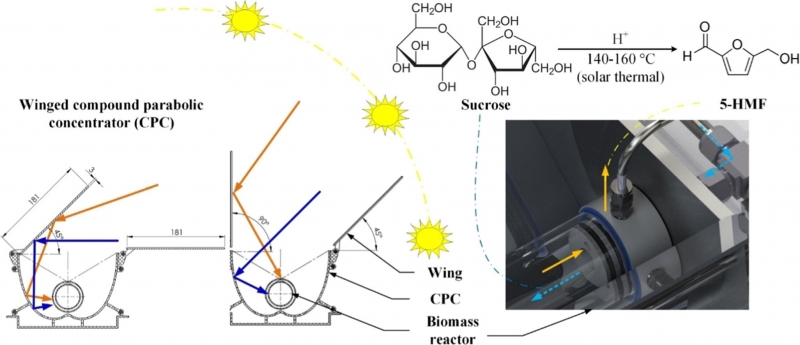Project summary
Competitive Advantage:
- Preconditioned biomass (from raw biomass stream) can be obtained at very low cost;
- Electrocatalytic hydrogen extraction from pre-conditioned biomass is generally easier than water electrolysis;
- It is selective, delivers zero carbon dioxide emissions and can produce value-added organic products with potential to be used as precursors for plastic fabrication
Impact:
- Competitive energy production by utilising waste to produce renewable hydrogen
- Alleviate global warming by reducing the carbon footprint
- Resource recovery and new materials
Successful application:
- Development of novel ‘winged’ solar concentrator with tube reactor for biomass conversion with boost thermal efficiency up to 25% at 150C
- CFD modelling indicate that full scale system can produce ~0.45kg of 5-Hydroxymethylfurfural per day with average daily solar input 5kWh/m2
Funder:
ARENA project - A zero-emission tandem array for transforming biomass into renewable hydrogen
Researchers:
- A/Prof Jason Scott
- A/Prof Dawei Wang
- Dr Nick Bedford
- Scientia Prof Rose Amal
Highlighted publications:
- Ligand-Promoted Cooperative Electrochemical Oxidation of Bio-Alcohol on Distorted Cobalt Hydroxides for Bio-Hydrogen Extraction, ChemSusChem, 2021, 14(12), 2612-2620
- A winged solar biomass reactor for producing 5-hydroxymethylfurfural (5-HMF), Solar Energy (2021), 218, 455-468
Collaborator:
- Origin Water International Pty Ltd;
- Apricus Energy Pty Ltd
Key results
This project successfully built and commissioned a micro-tubular reactor for catalyst screening and reactor performance tests. The miniaturised methanol production as hydrogen carrier from biomass pyrolysis syngas is technically feasible and economically viable under the current demand-supply-cost combination but vulnerable to external and market conditions. A comprehensive handbook was developed which documents the fundamental knowledge of methanol catalystic synthesis, and a design toolkit for the development, design, construction and operation of the minituarised methanol synthesis plant.
This project is funded by ARENA as part of the Advancing Renewables Program and completed in April 2023.
